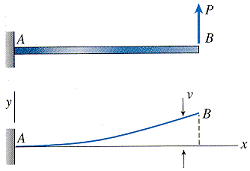
The St. Louis Arch sways about |
With a wind of 110 miles per hour, the 1454-ft |
example
from Mechanical Engineering Design, 5th Ed., by J.E. Shigley and C.R. Michke, McGraw-Hill, 1989, p95
terms
plane of bending - deflections will occur in a plane if the beam is symmetric around this plane deflection, ν - the displacement of any point along the beam from its original position, measured in the y direction
deflection curve
coordinate axes
angle of rotation, θ - the angle between the x-axis and the tangent to the deflection curve
slope of the deflection curve: dν/dx = tan θ
tan θ = θ for small angles
sign conventions
- the x and y axes are positive to the right and upward
- the deflection ν is positive upward
- the slope dν/dx and angle of rotation θ are positive when counterclockwise with respect to the positive x axis
- the curvature κ is positive when the beam is bent concave upward
- the bending moment M is positive when it produces compression in the upper part of the beam








